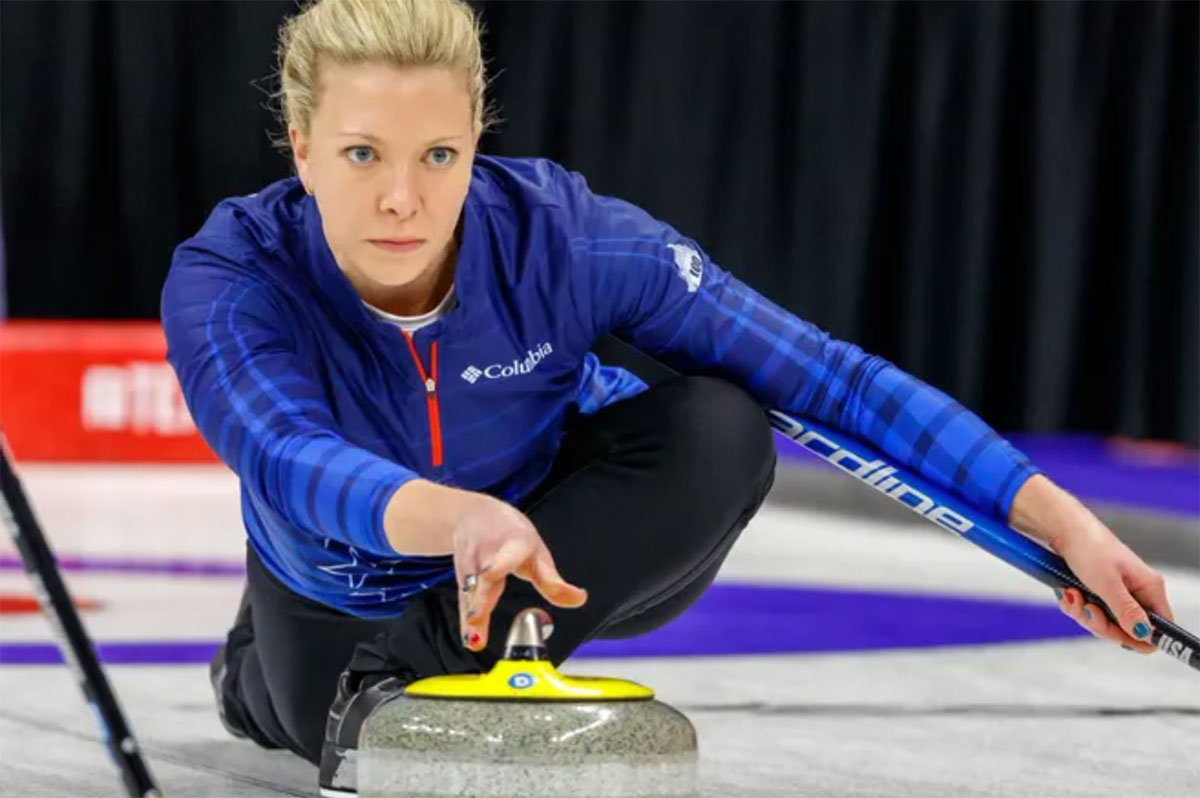How many Olympians also work full-time as nurses during a pandemic? Meet Nina Roth
How many Olympians hold down full-time jobs even as they train for their sport?
And how of those jobs are in nursing, in a two-year pandemic?
So if you see Nina Roth chasing a nearly 2-year-old around a park in Madison, stopping only once in a while to do a set of pull-ups on the monkey bars herself, don’t worry – she’s not lost her marbles.
She’s just … multi-tasking-training.

Photo: USA Curling, Bob Weder
Roth is headed to Beijing in a matter of weeks as part of Team Peterson. This will be her second Olympics, and everything is different this year. Her life, her work, even her position.
But it’s all good because her son, Nolan, will turn 2 in February while she’s competing for a medal. And she decided to keep working at her job, despite all the additional challenges from COVID-19.
The job
Roth is a supervisor and a nurse who works three 12-hour shifts a week at Select Specialty Hospital. She’s worked there nine years. And this is the kind of facility that gets the COVID recovery patients, like people who are unable to wean off the ventilator or have other effects from the disease.
“They come to us before they go to a long-term care facility,” said Roth.
More:Meet Team USA Olympic curlers Becca and Matt Hamilton: Mentors, coaches and siblings
Roth decided she needed to keep working in 2021, even as nurses and others in the medical profession are reporting exhaustion and burnout.
“I really don’t want to slow down,” Roth said during an interview last month as the delta variant was still affecting people and the omicron variant was starting to surge before the holidays.
“I’m very much needed at my hospital and I love what I do. And even though it’s very hard, I know that especially now I have an ability, and I have the training to be on the floor. I need to be there for my patients and for my hospital.”
How it all works
This work-life-Olympic balance doesn’t just happen. It takes a lot of planning and juggling, support and sacrifice.
The days Roth is pulling the 12-hour shifts, she slips in a short workout – maybe 20 minutes of strength training or cardio – at the end of the day.
“Basically, whatever I can bear before I need to pass out and go to sleep,” Roth said.
On the non-nurse days, Roth wakes at 6:30 in the morning to get in her workout before Nolan wakes up. When he does get up, they’re off to a park or playground.
“I try to be as active with him as possible, and wear him out before I take him to Grandma’s,” said Roth.
Alane and Ken Spatola then watch the little one while Roth heads off to practice with fellow Madison-area curler Becca Hamilton.
“I would love to be able to focus 100% of my time on curling, but nursing is also a big passion of mine,” said Roth. “And so if I wasn’t doing at least a little bit of both, I wouldn’t feel quite as fulfilled, I don’t think.”
The Beijing Organizing Committee of the Olympic Games is being very strict about who will be allowed into the country. Everyone must be vaccinated (or medically exempted) and everyone has to test negative in the days leading up to travel.
More:Nickel: Jordan Stolz is the diversion we need – if we can keep what he’s doing in perspective
Roth said USA Curling has a great plan in place for travel, so much so that she’s been able to concentrate on her work, her family and curling.
She does recommend the COVID-19 vaccination, based on her years of experience in treating patients.
“That’s what’s going to keep you out of the hospital. Or at least lower your chances of getting admitted,” Roth said. “And having life altering effects.
“I’ve seen firsthand COVID tear apart a person’s body and tear apart a person’s family and it’s really heartbreaking to be taking care of someone and it’s too late for them to get vaccinated. They didn’t make that choice to get vaccinated and they’re wishing that they had, or family members are wishing that their loved one had gotten vaccinated.”
Protect her at all costs
Roth has in the meantime worked to get in the best shape after having a baby. She said she knew going from the skipping position to a sweeping position that she was going to need extra endurance and extra strength. She accomplished that.
Can we protect Roth at all costs? And keep her safe, for all that she’s done for others and for what’s at stake in the next month? Roth said her hospital does a good job of protecting her when at work with guidelines and equipment.
“And then when we’re out in public, when we’re training, we’re trying to socially distance as much as possible,” said Roth. “We’re not traveling by plane (to pre-Olympic competitions) – so that that makes me feel better. It’s me and Becca driving in a car, rather than sitting next to 100 strangers. In preparation for Beijing, we’ll have to do a lot more. We’ll have to be cautious during our travels there.”
American curlers do not have any competitions left to prepare for Beijing.
The national championships and the Curling Grand Slam event in Canada, both scheduled for January, were canceled due to COVID concerns. So Team Peterson will face the same challenges as every other team competing in Beijing with their last serious competitions well behind them.
Everyone will have to adapt, and that’s something Roth has been perfecting for the last two years.
